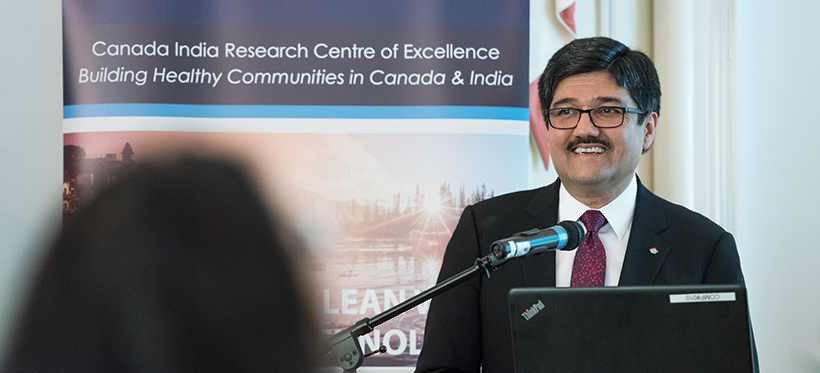IC-IMPACTS (the India-Canada Centre for Innovative Multidisciplinary Partnerships to Accelerate Community Transformation and Sustainability) marked the completion of its first five years by bringing together researchers to discuss their progress on infrastructure, water and health challenges. Special guests at the two-day research conference included India’s High Commissioner to Canada, His Excellency Vikas Swarup, and the Consul General of India to Vancouver, Abhilasha Joshi. The Thursday panel session featured presentations by Civil Engineering faculty, Dr. Nemkumar Banthia and Dr. Pierre Bérubé.
IC-IMPACTS projects focus on several research areas:
- low-carbon materials
- strengthening infrastructure
- sensors for structural, water, and health monitoring
- alternative power supplies
- water treatment systems
- rapid diagnostic devices
- solutions to infectious and water-borne diseases
- mobile heath technologies
As IC-IMPACTS CEO and Scientific Director, Dr. Banthia provided an overview of the achievements and plans made by this Research Centre of Excellence, including his research on the structural and environmental benefits of using industrial wastes to create fibre-reinforced concrete. His pilot project in Thondebhavi, India has successfully demonstrated how concrete with hydrophilic fibers can not only heal cracks as they form, but reduces its carbon footprint by 50% while extending its lifetime three times over. The next project demonstrating this technology will benefit a community in Canada, the Fisher River Cree Nation.
In the water panel, Professor Bérubé discussed his work developing a passive membrane system demonstration project. He has been collaborating with IC-IMPACTS to make membrane filtration technology (currently prohibitively expensive and complex) cost-effective and modular so it can be put to use in smaller, more remote communities. Tested in a 15 month pilot project at the Eagle Lake Reservoir in West Vancouver, Bérubé’s new system runs on a small battery and requires maintenance every six months, while cleaning water for 10-100 homes – all at a cost of $0.05-$0.50 a day per person. Now at the commercialization stage, this new technology only needs to develop a market-ready version and gain health authority approval before it is ready for use. An upcoming pilot in BC’s Hupacasath First Nation will bring it one step closer to this goal.
Themes that came up during the panel discussions were the importance of creating technology solutions that can be practically applied, opportunities for collaboration between researchers, and thinking about how these solutions could work together. IC-IMPACTS is a fundamentally collaborative undertaking, creating not only a partnership between nations, but fostering the conversations between scientists that create real world solutions.
